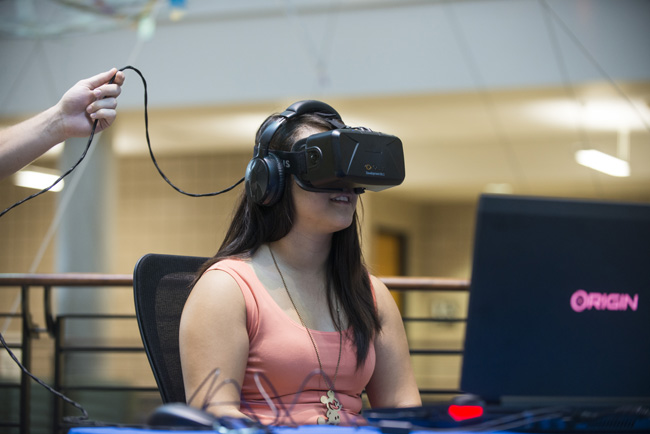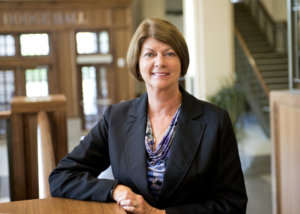
Juhyun Kwon, a marketing major at Minnesota’s Carlson School of Management tries out General Mill’s Oculus Rift at a recruiting event. Photo courtesy of Carlson School of Management
As Juhyun Kwon walked through a September recruitment event on the campus of Minnesota’s Carlson School of Management, the General Mills table caught her eye. A box of Lucky Charms or Honey Nut Cheerios didn’t draw her in—but a large set of goggles did. Kwon tried on the goggles and was soon on a virtual realty tour of the company’s Golden Valley, Minnesota, campus. She was able to visit everything from the company gym to executive offices–virtually, of course.
“I loved the experience because it was something completely different from what you normally see,” says Kwon, a junior majoring in marketing. Kwon and her fellow students are used to showing up at information sessions, corporate presentations, and networking events from top corporate recruiters. “It can be very similar from all of the different companies,” she admits, speaking of the monotony of on-campus recruiting.
Not General Mills. The company’s goggle tours use GoPro footage to take a creative look at what it’d be like to work for them. The technology, dubbed Oculus Rift, sounds just as much like it’s from a Transformers movie as it does a futuristic recruiting tactic. “It was fun. They used their cereal mascots like the Lucky Charms guy and the Cheerio’s bee,” Kwon explains. “Personally, I haven’t seen any other tools like this from other companies yet.”
LONG-WINDED POWERPOINTS NO LONGER CUTTING IT
The unique tactic comes at a time when companies are trying to differentiate themselves in the eyes of millennial business students. Nowadays, students have been inundated in messaging and technology and are comprised of a generation wired since birth. Many companies that don’t have immediate tech ‘street-cred’—such as the Apples, Googles, and Amazons of the world—are coming up with some creative and tech-savvy ways to get the attention of top talent. In addition to General Mills’ Oculus Rift, Goldman Sachs is using Snapchat to recruit college students, and PwC is even offering to pay back student loans for its junior employees.
It’s a sign of the times, according to Susie Clarke, director of the undergraduate career services office at Indiana University’s Kelley School of Business. “Before the web, long presentations were OK, because it was the only way to get information about the companies,” Clarke explains. “Now it’s so readily available to these students. They don’t need that. It’s all online.”
Carlson’s Career Center Director Maggie Tomas concurs. “Companies are getting creative and going beyond the typical campus info session that is usually just sharing some slides and that’s it,” she says.
Among the stunts in recent years, companies have brought sports cars, ATVs, burrito trucks, ice cream trucks, coffee trucks, and personalized baseball cards. “There’s always someone looking for an edge to brand themselves with our students and get their attention,” Clarke adds, noting she’s been seeing it happen for a while.

Susie Clarke, director of Indiana Kelley’s Undergraduate Career Services Office. Photo courtesy of Indiana Kelley
COMPANIES COMPETING FOR STUDENT ‘MINDSHARE’
Clarke says Polaris, a snowmobile and all-terrain vehicle (ATV) manufacturer brought ATVs to the doors of Kelley’s campus. General Motors recently took it a step further at the University of Michigan’s Ross School of Business. The Detroit-based car manufacturer parked cars on the school’s stoop and invited students to take test drives. And of course they didn’t bring the latest line of Buick LeSabres—they brought Camaros and Corvettes.
“Every year, some company will do something that makes us sit around the career services office and say, ‘that was really clever,’” explains Damian Zikakis, the director of career services at Michigan’s Ross School, adding that companies are constantly competing with one another for student “mindshare.”
“What I’ve seen is that the stunts are different attempts to try to capture mindshare or standout from the company that was here the day before or is coming the day after,” Zikakis continues. “Like everything else, students are paying attention to so many sources of input and the companies are all trying to stand out and be different.”
Clarke is seeing the same at Kelley, saying the unique strategies are “definitely about marketing and differentiating themselves in our student’s eyes.”











Questions about this article? Email us or leave a comment below.